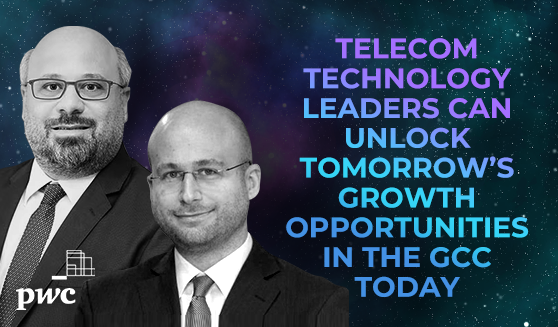
There is heated competition for market share among GCC telecom operators. The result is a slow, but steady increase in capital expenses and sluggish revenue growth. Operators need to break out of today’s stagnant environment to capitalize on tomorrow’s growth opportunities. A lot can and is being done in market-facing function. In addition, telecom chief technology officers (CTOs) and the technology function can and should play an essential role in this quest.
The fierce competition in mobile broadband is reducing prices and accelerating the shift away from fixed broadband. In Saudi Arabia, for instance, generous fair usage policies with unlimited social media and fixed-wireless data plans are major contributors to declining data yields. Consequently, we calculate that fixed wireless access market grew by approximately 40% since 2021 at the expense of fiber connectivity.
Meanwhile, new technologies and players are intensifying competition. Telecom operators continue to face competitive threats from alternative technologies, such as the virtual network functions offered by hyperscalers (large cloud and tech companies), and unconventional connectivity providers, such as low earth-orbit satellite operators.
The stagnant environment could make it difficult for telecom operators to muster the resources to exploit the region’s growth opportunities. Again, Saudi Arabia provides good examples. We forecast that demand among Saudi consumers for digital services, gaming, media, and consumer devices, including 5G handsets, is expected to grow by double digits over the next three years. We estimate that new fixed broadband infrastructure development could connect 3.5 million new households, a revenue opportunity of SAR 4 billion ($1 billion). Similarly, we believe that demand for business-to-business digital services, including the Internet-of-Things (network of connected devices), cybersecurity, and cloud, could grow by 15% per annum over the coming three years. In addition, more than SAR 1 trillion ($266 billion) in new government spending is forecasted in 2023 which promises to drive demand for business-to-business digital services and mega projects. There are similar trends across the GCC.
Telecom operators can address their current challenges and prepare to capitalize on the looming opportunities for growth in the GCC by reshaping their technology capabilities. To achieve this, leadership teams and especially CTOs should have six priorities.
First, telecom CTOs should re-architect their technology landscape. Operators should accelerate their adoption of configurable and modular cloud-based applications to cut the time to market for core products. They need to simplify and delayer their technology infrastructure to better manage costs, bolster value creation, and focus on service innovation (versus infrastructure management). Zain’s recent sale of its 8,000 telecom towers is one example of how delayering can create value for GCC telecom operators.
Second, telecom CTOs should transform telecom assets into platforms and marketplaces. Operators possess a differentiated wealth of data and services that offer compelling value to business customers. GCC telecoms can intensify efforts to commercialize underutilized assets, as global operators, such as AT&T, have. Similarly, they can use open application programming interfaces (APIs) to create marketplaces that attract API suppliers and application creators.
Third, telecom CTOs should accelerate migration to the cloud. Cloud network functions are no longer a differentiator in the telecom sector, they are essential to its development. The operators that move first to offer cloud solutions will gain a march on their competitors. They will be positioned to partner with large cloud providers on Edge computing and enterprise solutions, such as the partnership between Verizon and Amazon Web Services—Verizon provides fiber and 5G transmission and AWS public cloud for its global customers.
Fourth, telecom CTOs should reinforce technology innovation. Operators need to become technology innovators (versus consumers) if they are to diversify into new digital and technology services outside of their core businesses. Innovation means technology leaders can support and steer investments in critical future technologies. It provides a foundation for innovation hubs and partnerships, such as Orange’s Hello Future initiative, needed to experiment and incubate new services that incorporate emerging technologies, such as drones, the metaverse, and blockchain.
Fifth, telecom CTOs should adopt new and agile delivery models. Technology organizations in telecom need to build solid capabilities to support internal and external customers with solutions. They need to actively engage with business units in the sales process—an imperative if operators are to capture a share of the digital services opportunities from megaprojects. In addition, adopting agile delivery for all core products using design thinking principles can cut delivery times to eight weeks, while doubling organizational agility levels.
Sixth, telecom CTOs should continuously strive for operational excellence. They should consider how they can reshape outsourcing strategies and supplier quality management to operate more efficiently with multiple vendors. Moreover, they should examine how they can better integrate field services and commercial operations to bolster customer experience and capture synergies. Cost effective, end-to-end technology service management is essential to delivering on telecom value creation and growth.
As GCC operators grapple with a highly competitive environment, their technology organizations can play a vital role. Savvy telecom CTOs will take up this challenge by enabling their companies to wrest greater value from today’s slow core growth markets and position themselves to exploit noncore opportunities.








